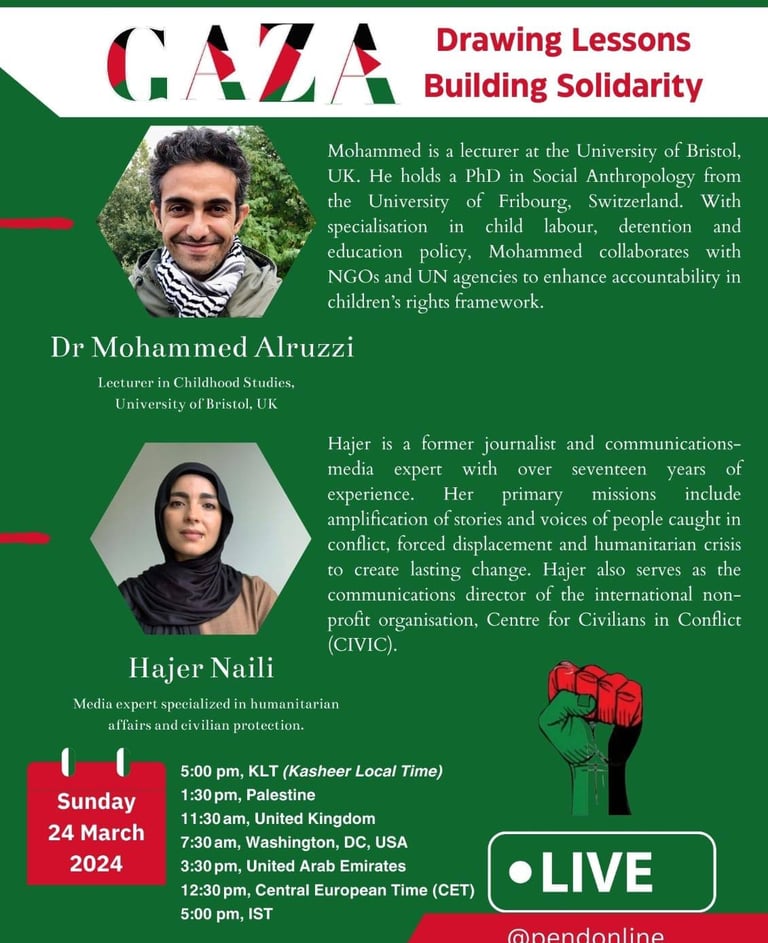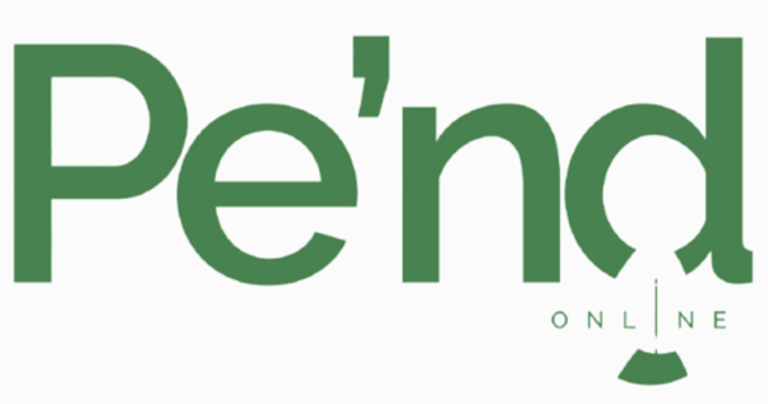Gaza: Drawing Lessons and Building Solidarity
SOCIETY


In this thought-provoking panel discussion, experts came together to unpack the ongoing humanitarian crisis in Gaza, reflect on the lessons learned from decades of conflict, and explore avenues for building global solidarity. Hosted by Touseef Yusuf of the University of Bath, the session brought together:
Dr. Mohammed Alruzzi – Lecturer in Childhood Studies at the University of Bristol, UK, who offered an in-depth analysis of how conflict affects children and communities.
Hajer Naili – A media expert in humanitarian affairs and civilian protection, who discussed the critical role of media narratives in shaping public perception and mobilizing support.

Key Themes and Objectives
The panel focused on several interconnected themes:
Understanding the Human Cost: Exploring the profound impact of ongoing conflict on vulnerable populations in Gaza, with a special emphasis on children.
Media and Narrative: Evaluating how media representations influence public perception of the crisis and affect humanitarian response.
Lessons from the Ground: Drawing practical lessons from Gaza’s experiences that can inform policies and community-led initiatives worldwide.
Building Solidarity: Discussing how global and local communities can come together to support Gaza, ensuring that the voices of those affected are heard and that their rights are protected.
Expert Insights
Dr. Mohammed Alruzzi – The Impact on Children and Communities
Dr. Alruzzi highlighted the following points:
Childhood in Conflict:
He explained that the continuous exposure to violence, instability, and trauma has profound effects on children’s psychological development, education, and overall well-being. The stress and uncertainty of growing up in a conflict zone often lead to long-term emotional and cognitive challenges.Resilience and Vulnerability:
While children in Gaza display remarkable resilience, their vulnerability underscores the urgent need for targeted interventions. Dr. Alruzzi emphasized that safeguarding childhood in such contexts requires a robust framework of psychosocial support and protection policies.Lessons for Policy:
Drawing on empirical studies and field experiences, he urged policymakers to integrate child-focused strategies into humanitarian and reconstruction efforts, ensuring that any long-term peace process includes robust support systems for the youngest members of society.
Hajer Naili – Media’s Role in Shaping Narratives and Mobilizing Support
Hajer Naili offered critical perspectives on the role of media:
Ethical Reporting and Narrative Framing:
Naili discussed how media narratives can either amplify suffering or humanize the plight of Gazans. She stressed the need for balanced, fact-based reporting that avoids sensationalism while providing a comprehensive view of the crisis.Mobilizing Global Solidarity:
By highlighting real-life stories and the everyday struggles of civilians, ethical media coverage has the power to galvanize international support and pressure decision-makers to act. Naili called on journalists and media houses to collaborate with humanitarian organizations to ensure that reporting leads to constructive engagement rather than mere awareness.Challenges and Opportunities:
She also noted the challenges posed by political biases and the rapid spread of misinformation. However, with the rise of independent media platforms and social media networks, there are new opportunities to bypass traditional gatekeepers and reach a global audience directly.
Discussion on Lessons and Solidarity
The panel discussion moved seamlessly between personal narratives and broader geopolitical analysis:
Drawing Lessons from Gaza:
Both experts agreed that while Gaza’s situation is complex and multifaceted, there are universal lessons to be learned—especially regarding the resilience of human spirit in the face of adversity. The discussion emphasized that these lessons should guide future humanitarian policies and interventions worldwide.Building a Global Network of Solidarity:
The speakers stressed the importance of international solidarity. They proposed establishing cross-border collaborations between academic institutions, media organizations, NGOs, and local community groups to create a united front in support of Gaza.Actionable Strategies:
Among the strategies discussed were the need for improved humanitarian funding mechanisms, robust advocacy campaigns, and the establishment of support networks that can provide both immediate relief and long-term developmental assistance.
Conclusion
The panel discussion on "Gaza: Drawing Lessons and Building Solidarity" provided a nuanced exploration of the Gaza crisis through the lenses of childhood studies and media ethics. Dr. Mohammed Alruzzi illuminated the devastating impact of conflict on children and communities, urging for child-centered humanitarian interventions. Hajer Naili, meanwhile, underscored the transformative potential of ethical media in mobilizing global support and shaping a more informed public discourse.
Under the thoughtful moderation of Touseef Yusuf, the discussion not only highlighted the challenges but also offered a roadmap for building a more compassionate, coordinated response to Gaza’s enduring crisis. The session ultimately served as a call to action—inviting academics, media professionals, policymakers, and concerned citizens to unite in solidarity with Gaza and work collectively toward a more just and humane future.
